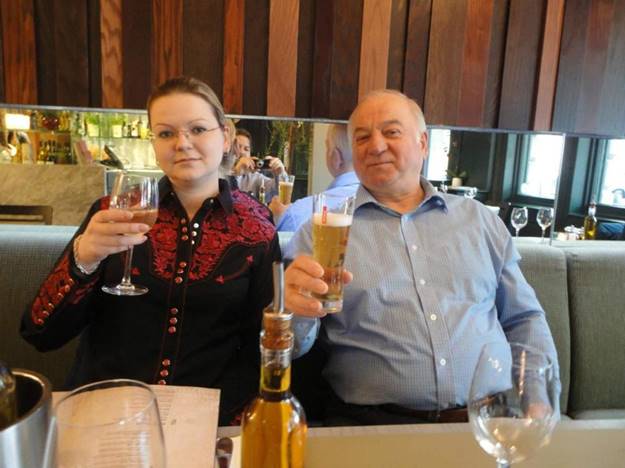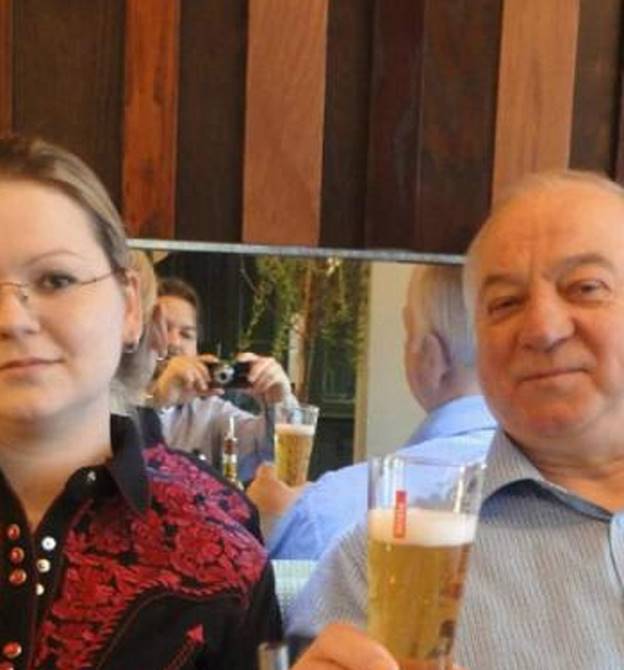|
Sergei Skripal was a former Russian double agent for Britain. After a high-profile spy swap in 2010, he lived in Salisbury, England, near his former MI6 handler, Pablo Miller, who he reportedly kept in touch with.
Late in the afternoon of March 4th, 2018, Skripal and his daughter Yulia, who had flown in from Moscow the previous afternoon to get Sergei’s blessing for a marriage, were found in distress on a Salisbury park bench. The British Army’s top nurse, Col. Alison McCourt and her 16-year old daughter, Abigail, apparently the first to notice them, promptly gave them CPR (1). The Skripals were sent to nearby Salisbury District Hospital, which had a covert relationship with Porton Down (2), the British government’s chemical warfare research laboratory. They were not expected to survive.
This quickly turned into an international story. Within hours of the news of the Skripals poisoning, Foreign Secretary Boris Johnson and Prime Minister Theresa May — with no evidence — claimed that Russia had attacked them with a nerve agent they called “Novichok”. Russians disputed that claim, noting that exposure to that nerve agent, better known as A-234, causes virtually immediate death.
The Skripals’ activities before they collapsed were a mystery. Security officials claimed that the GPS of their cell phones had been turned off for the four hours before they were found (3) and many of Salisbury’s CCTVs that should have captured their activities were not working (4). CCTV’s had caught Sergei’s red BMW at 9:15 am near the cemetery where Yulia’s mother and brother were buried, and at 1:35 pm when they parked near Salisbury’s popular Maltings shopping area. They were found on the Maltings Park bench less than 45 minutes after they had reportedly left Zizzi’s restaurant.

There are two widely-published photos of Sergei and Yulia “at Zizzi’s” taken in different years. This photo, which appears to be the more recent, indicates that Sergei knew the photographer, who shared their table along with a fourth person, whose glass is also visible. The photographer inadvertently took his own picture because of the mirror just behind the Skripals.
Since the photographer (and friend) appear to have been the last people who saw them before their collapse, the UK government should have identified him as a major person of interest to interview. Its lack of interest speaks for itself.

Russia went to the UN Security Council on March 13th to call for an inquiry into the poisoning. The UK not only vetoed an inquiry, but pressured countries to expel members of the Russian diplomatic corps. Despite the lack of evidence against Russia — and the many reasons why it would not have been in Russia’s interest to have done this – almost 30 countries obeyed and about 150 Russians were expelled. The Skripal poisoning also discouraged football fans from attending Russia’s hosting of the upcoming World Cup in Moscow.
In the midst of a barrage of media coverage claiming the danger to the public of this nerve agent, a mid-March letter to The London Times from Steven Davies, described as “Consultant in emergency medicine, Salisbury NHS Foundation Trust”, stated:
Sir, Further to your report “Poison exposure leaves almost 40 needing treatment”, Mar 14, may I clarify that no patients have experienced symptoms of nerve agent poisoning in Salisbury and there have only ever been three patients with significant poisoning. (5) [emphasis added]
The third person referred to, policeman Nick Bailey, was not a “first responder” as the government had claimed, but became ill only after visiting the Skripal house on March 8th, four days after the poisoning. The actual first responders, Col. McCourt and her daughter, were unaffected despite being vomited on by the Scripals! (6)
On April 12, the UN’s OPCW (Organisation for the Prohibition of Chemical Weapons) published a summary that “confirmed the UK’s identification” of the agent – without specifying what that was or where it came from. One of the OPCW’s laboratories, in Spiez, Switzerland, broke ranks to imply that Britain’s A-234 sample was not only fraudulent and could not have been used on the Skripals, but contained BZ (7), a non-lethal agent possessed only by the US, UK and NATO countries.
An ominous silence
Before Yulia was released from the hospital in early April (“to a secure location”) she called her cousin Viktoria in Russia; the call was recorded and quickly broadcast. Within an hour of the Russian broadcast, there was a bizarre British broadcast in which Yulia claimed that she wanted to be left alone: “At the moment I do not wish to avail myself of [Russian embassy] services” (8). The language used was not Yulia’s.
Around the April 20th weekend when Sergei was expected to leave the hospital, Britain announced that it had identified suspects in the poisoning: two Russians who had returned home. There was no further news about the Skripals for weeks. The suggestion that the Skripals were to be given new American identities made no sense because they would be recognized anywhere. By staying, they could make money by providing media accounts of what had happened to them — accounts that might have contradicted those of the Prime Minister, the Foreign Secretary and the Director General of MI5 — and possibly brought down the government.
Russia escalated its attempt to contact Yulia to the United Nations Security Council on Monday, April 23rd, but was rebuffed by the British claim that she did not want to speak to them. In fact, given her silence, many suspected that Yulia was dead.
But on the evening of Wednesday, May 23rd, 2018, Yulia appeared on British TV and delivered a scripted speech in what appeared to have been English translated into Russian. Walking in a park-like setting that her cousin Viktoria believed was a military base, Yulia said that she had been physically and emotionally devastated by the poisoning but hoped to return to Russia after her father regained his health. At the end, she was seen signing the statement. (9) That was the last that was publicly seen of either of the Skripals.
But Novichok was soon in the news again. In early July a couple from Salisbury became ill from what was believed to be the same poison that had affected the Skripals. Dawn Sturgess sprayed her wrists with what she thought was perfume from a sealed bottle she had found in a dumpster; when her partner Charlie Rowley took it, the bottle fell apart in his hands. (10) Sturgess died and was quickly cremated by the British government.
Ominously, on Sept 1st, 2018, The Guardian reported that the ambulances used for the Skripals had been sealed in a hazardous waste landfill site near Bishop’s Cleeve in Gloucestershire. (11) Later that fall, the British government announced that it would purchase the Skripal house as well as that of Nick Bailey “to decontaminate” them. In January, 2019, a military team was sent to seal and replace the roof of the Skripal house.
Why was Sergei Skripal targeted?
Russia had nothing to gain from the poisoning of Sergei and Yulia Skripal. It had not only lost diplomatic staff from 30 countries, but the poisoning occurred three months before its hosting of the World Cup in Moscow. Any country that murdered its former agents – particularly with their children — would discourage would-be agents from that employment.
Although Britain’s involvement in the poisoning and the cover-up were apparent – even senior UK civil servants refused to pretend that Russia was responsible (12) — its motive was not.
Initially, it appeared to former government whistleblowers that the motive might have been connected to Sergei Skripal’s relationship with his handler Pablo Miller, whose name had been protected by a government gag order soon after the poisoning. Miller was a colleague of Christopher Steele, author of the fabricated Russian dossier on Donald Trump: perhaps Skripal had been involved with that dossier and tried to extort money for what he knew?
In January, 2019, the hacking group Anonymous released papers that pointed to the actual motives. In December, 2018, Anonymous had revealed the existence of two powerful British intelligence “charities”, the Institute for Statecraft and its so-called Integrity Initiative program; both are led by top names in British intelligence and funded by the British government, the US government, and recently, even Facebook. (13) The “charities” coordinate government and media to implement a cold-war agenda to isolate Russia and encourage a conflict. In January, Anonymous revealed a document that suggested goals for the Integrity Initiative that included the dismissal of Russian diplomats from as many countries as possible and damaging Russia’s hosting of international events. (14) The budgets of both charities increased dramatically before the Skripal poisonings; after the poisonings, the charities carried out extensive monitoring of international media responses. (15)
It thus appeared that the inclusion of Yulia Skripal in the poisoning had not been accidental but was an intentional bonus to this media-oriented operation. The apparent murders of Sergei and Yulia Skripal demonstrate the lengths to which British military intelligence was prepared to go to demonize Russia.
The Anonymous revelations also highlight the critical importance of independent, alternative media as well as of media freedom. Despite the previous insiders’ assumptions that Sergei Skripal must have contributed to his misfortune, the war-mongering motives of the British military/intelligence community had been hidden before Anonymous’s release of the information. US President Donald Trump’s additional Russian sanctions of August 2019, based on the spurious account of the poisoning, demonstrate the failure of the mainstream media to publicize the Anonymous revelations and their implications.
Could demanding proof that the Skripals are alive – and calling for British government accountability if they are unable to demonstrate that – impose limits on future actions of British military/intelligence? If British leadership is allowed to get away with two such public murders, there will be little to stop more in the future.
*
Note to readers: please click the share buttons above or below. Forward this article to your email lists. Crosspost on your blog site, internet forums. etc.
Karin Brothers is a freelance journalist.
Notes
1. 21wire. SKRIPAL: The Nurse’s Tale Makes a Mockery of UK State-Media “Poisoning” Narrative. January 26, 2019. https://21stcenturywire.com/2019/01/26/skripal-the-nurses-tale-makes-a-mockery-of-uk-state-media-poisoning-narrative/
2. Ibid.
3. Nicholls, Peter. “Missing Hours: Skripals’ Cell phones Reportedly Turned Off on Day of Attack”. REUTERS. 12 March, 2018.https://sputniknews.com/military/201803261062902960-skripals-cellphones-gps/
4. “Was Salisbury’s CCTV on’ at time of ‘nerve agent’ attack?” SpireFM. 13 March, 2018. https://www.spirefm.co.uk/news/local-news/2526330/was-salisburys-cctv-on-at-time-of-nerve-agent-attack/
5. Moon Of Alabama. “No Patients Have Experienced Symptoms Of Nerve Agent Poisoning In Salisbury” 19 March 2018.www.informationclearinghouse.info/49030.htm
6. 21wire. SKRIPAL: The Nurse’s Tale Makes a Mockery of UK State-Media “Poisoning” Narrative. January 26, 2019 https://21stcenturywire.com/2019/01/26/skripal-the-nurses-tale-makes-a-mockery-of-uk-state-media-poisoning-narrative/
7. Birchall, Ben. “Russian Embassy in UK Doubts OPCW Skripal Probe as Swiss Lab Cites BZ Agent”. Sputnik International. 15 April 2018.https://sputniknews.com/europe/201804151063576783-skripal-case-bz-agent-opcw/
8. Murray, Craig. “Yulia Skripal Is Plainly Under Duress”. 11 Apr, 2018. https://www.craigmurray.org.uk/
9. Mendick, Robert; DAVIES, GARETH; LUHN, ALEC; “Yulia Skripal says she is lucky to be alive in first appearance since assassination attempt” THE TELEGRAPH. MAY 24, 2018. HTTPS://WWW.TELEGRAPH.CO.UK/NEWS/2018/05/23/YULIA-SKRIPAL-MAKES-FIRST-PUBLIC-STATEMENT-FOLLOWING-SALISBURY/
10. West, Alex. “Hell of losing Dawn: Novichok survivor Charlie Rowley reveals girlfriend Dawn Sturgess died after spraying poison on wrists”. The Sun. 22nd July 2018. https://www.thesun.co.uk/news/6835503/charlie-rowley-novichok-dawn-sturgess-death-details/
11. Press Association. “Salisbury novichok emergency vehicles buried in landfill site” The Guardian. Sat Sept. 1 2018. https://www.theguardian.com/uk-news/2018/sep/01/salisbury-novichok-emergency-vehicles-buried-landfill-site
12. Murray, Craig. “Senior Civil Servants Still Deeply Sceptical of Russian Responsibility for Skripal Poisoning”. 18 April 2018. https://www.craigmurray.org.uk/
13. McKeigue, Paul. Miller,David. Mason, Jake. Robinson, Piers. “Briefing note on the Integrity Initiative”. Working Group on Syria, Propaganda and Media. December 21, 2018.
http://syriapropagandamedia.org/working-papers/briefing-note-on-the-integrity-initiative/
14. Klarenberg, Kit. “Shock Files: What Role Did Integrity Initiative Play in Sergei Skripal Affair?”. Sputnik International. January 4, 2019 (updated January 28, 2019). www.sputniknews.com/europe/201901041071225427-skripal-integrity-initiave-miller/
15. Murray, Craig. “British Government Covert Anti-Russian Propaganda and the Skripal Case” Craig Murray Blog. December 21, 2018. www.craigmurray.org.uk/
Images in the body of the article are from the author; featured image is from RTE
|